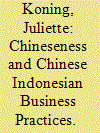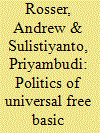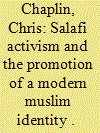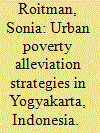| Srl | Item |
| 1 |
ID:
116857


|
|
|
|
|
| Publication |
2012.
|
| Summary/Abstract |
This paper explores some of the cross-cultural friendships of Western NGO workers with Indonesians, before and after the 2006 earthquake in Yogyakarta. These kinds of friendships enabled aid workers to transcend a private-professional divide which is often taken for granted. The paper draws attention to different cultural ideals of friendship and argues that cross-cultural friendships present a central instrument for establishing emotional belonging and for crafting identities. The social competences gained frequently moved beyond the individual private sphere and were turned into meaningful resources and professional qualifications relevant in development work. I argue that friendships act as mediators allowing aid workers to oscillate between different spheres of social engagement. This intermediate potential renders friendships highly relevant to more in-depth anthropological enquiry into development workers' everyday lives and their cultural positioning in foreign environments.
|
|
|
|
|
|
|
|
|
|
|
|
|
|
|
|
| 2 |
ID:
078523


|
|
|
| 3 |
ID:
151657


|
|
|
|
|
| Summary/Abstract |
Most studies on diversity in Southeast Asia focus on the nation-state, with much less attention given to everyday encounters and the negotiation of diversity in local contexts. This article investigates the discourses and practices of various actors in the historically tolerant, generally peaceful, and diverse city and special region of Yogyakarta, Indonesia. This study examines this ethnic, religious and cultural diversity and illustrates the negotiations among various interest groups and actors that strive to maintain this balance, or sometimes to strategically disrupt it. As such, the findings offer a different way to understand and interrogate the challenges confronting present-day diversity both on a local level in Yogyakarta, and also for Indonesia and Southeast Asia at large.
|
|
|
|
|
|
|
|
|
|
|
|
|
|
|
|
| 4 |
ID:
128532


|
|
|
|
|
| Publication |
2013.
|
| Summary/Abstract |
Since the fall of Suharto's New Order, Indonesia's central government has substantially strengthened the legal and financial basis of universal free basic education (UFBE). Yet sub-national governments have varied considerably in their responses to the issue with some supporting UFBE and others not. Why has this happened? What are the implications for the future of UFBE in Indonesia? And what does Indonesia's sub-national experience tell us about the political preconditions for UFBE in developing countries? We try to shed some light on these questions by examining the politics of UFBE in Bantul and Sleman, two districts in the Special Region of Yogyakarta.
We argue (i) that these districts' different responses to UFBE have reflected the extent to which their bupati have pursued populist strategies for mobilising votes at election time and there has been resistance to UFBE from groups such as business, the middle classes, and teachers; (ii) that Indonesia's sub-national experience suggests that there is an alternative pathway to UFBE besides organisation of the poor by political entrepreneurs; and (iii) that the future of UFBE in Indonesia thus rests on the nature of bupatis' strategies for advancing their careers and the strength of local groups opposed to UFBE.
|
|
|
|
|
|
|
|
|
|
|
|
|
|
|
|
| 5 |
ID:
158202


|
|
|
|
|
| Summary/Abstract |
Indonesia has witnessed the emergence of a market of Islamic goods, services and media platforms that have catalysed a qualitative shift in the ways individuals come to express their religious convictions. Salafi Islam is no exception to this transformation, and this article provides a case study of contemporary Salafi propagation amongst Yogyakarta’s students and graduates. Through description and analysis of campus based religious lectures, websites, magazines and fashion outlets linked to the al-Atsary Islamic Education Foundation, this article explores the intricacies of campus affiliated da’wa. Linked to a ‘literalist’ interpretation of Islam reliant on scholars in Saudi Arabia, Salafism is frequently denounced as foreign to Indonesian norms. Yet, while activists do indeed promote a rigid adherence to Islamic tenets, they also align Islamic values to concerns with a modern Muslim identity. By framing Salafism as sensitive to ideas of professional employment, while juxtaposing it against images of a less well-educated rural Islam, they have thus have created a unique strand of urban Salafi propagation.
|
|
|
|
|
|
|
|
|
|
|
|
|
|
|
|
| 6 |
ID:
169145


|
|
|
|
|
| Summary/Abstract |
A multidimensional understanding of poverty includes the access of poor groups to decision‐making processes based on their needs and aspirations. However, the realisation of this ‘right to make decisions’ faces multiple obstacles. Over the last 20 years in Indonesia, in a context of a more democratic political environment and policy decentralisation, poverty alleviation policies have followed institutional arrangements to provide communities with opportunities for greater participation in development projects. Poverty data show a clear improvement in the living conditions of urban poor citizens in Indonesia; however, it is unclear whether poor communities have become stronger and more independent from public grants and better able to make their own decisions. This research analysed two urban poor communities in Yogyakarta, Indonesia, and found that some communities working on participatory poverty alleviation strategies still face obstacles to becoming more independent and making their own decisions because they remain part of an historical legacy of top‐down approaches to poverty, highly dependent on government support and working only within ‘invited spaces’. Conversely, those communities with more limited access to government funding have been more innovative in their strategies and have created ‘invented spaces’ for collective action that allows them to be more independent and empowered.
|
|
|
|
|
|
|
|
|
|
|
|
|
|
|
|